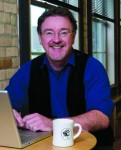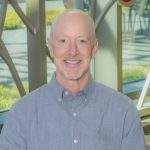Get a daily rundown of the top stories on Urban Milwaukee

When it comes to healthcare, holistic practices often focus on physical and emotional well-being in concert with one another, to help keep you away from the conventional doctor’s office. Photo by Dadda71/Flickr
By Colleen DuVall
_
The holistic health industry is one of those that boomed in the early ‘90s. Everyone seemed to be turning to the friendly neighborhood naturalist for advice. People began to question the over-prescribed pills suggested by their physicians, and seek out alternative methods of medicine and care on their own.
Now, with the future of health insurance coverage a huge looming question mark on the horizon and the recession still at large, what exactly is happening in the holistic health industry?
Trends would seem to indicate that people are turning to vitamin supplements more than ever. From Alice Landry’s article for the
Holistic Wellness Examiner, New Orleans, April 27, 2009: “Practitioners in the holistic health field believe their time is here and now. Former Olympic coach, Mary Joe Ruggieri founded and now directs the Columbus Polarity Center and the Ohio Institute of Energetic Studies and Bodywork. She believes holistic health to be an expanding, recession-proof industry and feels that by teaching patients about mind, body, and spirit wellness, holistic practitioners can help empower them to be advocates for their own well-being.”
Still, when people are watching their pennies, are they choosing to forgo these holistic treatments, seeing them as extras or luxuries that they simply cannot afford today? We checked in with some local groups and practitioners to see what they have noticed.
At Jensen Health & Energy Center in Elm Grove, two practitioners had some thoughts on current trends. Helen Miller, owner and acupuncturist, says: “Certainly many more clinics are offering several modalities now. Dr. Jensen was one of the first chiropractors in the Milwaukee area, 20 years ago, to offer massage and acupuncture, along with kinesiology and a focus on the importance of nutritional counseling. Now, chiropractors need to have a certification in nutrition, and it is becoming much more common to offer a team approach to holistic care. We recognize that it is often crucial to incorporate structural work with nutrition and acupuncture. Recovery is quicker and more complete.”
Miller continues: “Another newer development is ‘body/mind coaching,’ which includes mental and emotional aspects along with physical work to achieve improvement from the inside out. It’s an incredible method to discover blockages to health and take action to change them.”
In Miller’s experience, the recession has not dampened enthusiasm for holistic treatments: “Many people are concerned about their health and willing to keep health care on their priority list. They understand just how valuable it is to feel energetic and comfortable in their bodies.”
Also at Jensen Health and Energy, chiropractor Katharine Gandy specializes in “applied kinesiology.” Using this tool to evaluate the functional capacity of the nervous system, Gandy tries to detect physical, chemical, and emotional stress patterns in the body.
“People do not seem to be more interested in any one specific treatment, just any that will work for them,” says Gandy. “They are more willing these days to look for other options outside of the mainstream allopathic model. Maybe with health care reform talk has come an awareness that we as individuals have to take responsibility for our own health to ensure good affordable care down the road — and a prevention wellness model is key.”
According to Gandy, detoxification/purification programs are in big demand, and she cautions that they should be done under guidance of a healthcare professional and with the highest quality products.
“I think there is a greater awareness about all toxins that we encounter,” Gandy says, “I continue to receive many questions about the food we eat, things we breathe, dental amalgams, vaccines, etc. We do allergy/intolerance testing and receive many referrals for work with food and chemical sensitivities. Neuro-emotional technique is also a great tool for understanding patterns and finding connections between our body and our emotions.”
Gandy concludes: “I think the recession has had minimal effect on most areas of holistic healthcare. People need us now more than ever and regular visits and treatments now for your whole body can actually save health costs later … and everyone wants to experience a little stress relief!”
For more information on Jensen Health & Energy Center, go to www.health-energy.com. Their clinic is located at 500 Elm Grove Rd. Suite 325
Elm Grove, WI 53122 (262-782-1616).
Detox is the new buzz word
Dr. Meredith Young of Integrative Health Services LLC had this take on the issue: “Over the years (I have been in practice for 14 years now), I certainly have seen greater interest and more use of supplements. This year, ‘detox’ seems to be very popular. And I have noticed more people actually doing detox, not just reading about it. The internet has certainly played a role in people being more proactive in taking care and responsibility for their own health.
“That being said, with the economy, there has been a very obvious reduction in buying supplements, at least from my clinic. I don’t know if people are doing without, or buying from lower cost retail outlets, but my supplement business is definitely off from previous years.”
But if people aren’t buying Young’s supplements, they are signing up for treatments that they weren’t seeking before. Like yoga, some holistic practices are becoming more mainstream and therefore more popular.
“I continue to see a growth in my acupuncture practice,” says Young. “There has been more and more positive research into using acupuncture for everything from back pain to fibromyalgia to infertility, and more people are seeking it out. There is still, I believe, a lot of fear of the unknown and we still have a huge amount of education to do in the area of acupuncture — many people are amazed at how little it hurts — and Chinese herbs. But as it becomes more mainstream (it’s been on ‘Oprah,’ ‘Dr. Oz’ and several other shows like ‘Private Practice’), people will become more comfortable with the idea of getting acupuncture.”
Young sums it all up: “And some of the increase in popularity of acupuncture may also have to do with the economy and the state of managed healthcare. With unemployment and loss of health insurance, people seem to be seeking ways to take care of their health in an economical and curative way. Some of it is preventive. Some of it is acute care that provides lasting results by treating the root. And it is economical.”
You can find out more about Dr. Young and Integrative Services at www.inhealthservices.com.
For information about holistic healthcare in general, visit the American Holistic Health Association online: www.ahha.org.
Gandy concludes: “I think the recession has had minimal effect on most areas of holistic healthcare. People need us now more than ever and regular visits and treatments now for your whole body can actually save health costs later.”
_
Detox is the new buzz word
Dr. Meredith Young of
Integrative Health Services LLC had this take on the issue: “Over the years, I certainly have seen greater interest and more use of supplements. This year, ‘detox’ seems to be very popular. And I have noticed more people actually doing detox, not just reading about it. The internet has certainly played a role in people being more proactive in taking care and responsibility for their own health.
“That being said, with the economy, there has been a very obvious reduction in buying supplements, at least from my clinic. I don’t know if people are doing without, or buying from lower cost retail outlets, but my supplement business is definitely off from previous years.”
But if people aren’t buying Young’s supplements, they are signing up for treatments that they weren’t seeking before. Like yoga, some holistic practices are becoming more mainstream and therefore more popular.
“I continue to see a growth in my acupuncture practice,” says Young. “There has been more and more positive research into using acupuncture for everything from back pain to fibromyalgia to infertility, and more people are seeking it out.
There is still, I believe, a lot of fear of the unknown and we still have a huge amount of education to do in the area of acupuncture — many people are amazed at how little it hurts — and Chinese herbs. But as it becomes more mainstream (it’s been on ‘Oprah,’ ‘Dr. Oz’ and several other shows like ‘Private Practice’), people will become more comfortable with the idea of getting acupuncture.”
Young sums it all up: “And some of the increase in popularity of acupuncture may also have to do with the economy and the state of managed healthcare. With unemployment and loss of health insurance, people seem to be seeking ways to take care of their health in an economical and curative way. Some of it is preventive. Some of it is acute care that provides lasting results by treating the root. And it is economical.”

















